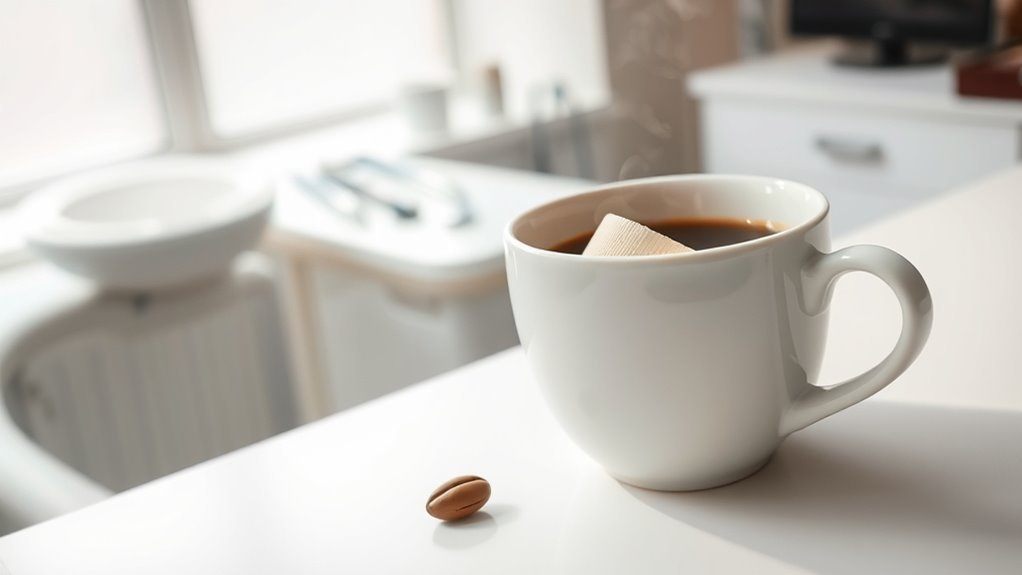Can You Drink Coffee After Having a Tooth Pulled
After having a tooth pulled, it’s best to avoid coffee for at least 24 hours. Drinking coffee too soon can disrupt blood clot formation and irritate your healing gums. Caffeine can also hinder blood flow, impacting your recovery. Instead, stick to lukewarm beverages and stay hydrated with water. Listening to your body is key during this time. If you want to know more about ensuring a smooth recovery, keep going for additional tips and advice.
Understanding the Healing Process After Tooth Extraction

When you undergo a tooth extraction, understanding the healing process is essential for a smooth recovery. The healing timeline typically spans several stages. Initially, in the first 24 hours, your body forms a blood clot in the empty socket. This is vital for healing. During the next few days, you might experience swelling and discomfort; ice packs can help manage this. By the end of the first week, the swelling should subside, and you’ll start feeling better. As you move into the second week, tissue begins to regenerate, leading to a significant reduction in pain. By the third week, you’re likely back to normal activities. Staying informed about these recovery stages can empower you to take charge of your healing journey.
The Effects of Coffee on Healing
When you’re healing after a tooth extraction, it’s important to contemplate how coffee can affect your recovery. Caffeine can influence blood flow, potentially impacting clot formation, while the acidic nature of coffee may irritate your healing gums. Understanding these factors can help you make informed choices about your coffee consumption during this time.
Caffeine and Blood Flow
Although coffee is a beloved beverage for many, its caffeine content can have significant effects on blood flow, which is crucial for healing after a tooth extraction. Caffeine metabolism can influence your body’s circulation, potentially affecting how quickly you recover. When you consume caffeine, it may cause blood vessels to constrict, leading to reduced blood circulation. This can slow down the delivery of essential nutrients and oxygen to the affected area, hindering the healing process. Consequently, you might want to limit your coffee intake in the days following the extraction. By doing so, you can support ideal blood flow, promoting faster recovery and ensuring your body can heal effectively. Always listen to your body and consult with your dentist for personalized advice.
Impact on Clot Formation
Caffeine’s influence on blood flow can also impact clot formation after a tooth extraction. When you consume coffee, the caffeine can increase blood circulation, which might affect the stability of the clot that forms in the extraction site. A stable clot is essential for proper healing and can greatly influence your healing timeline. If the clot dislodges too soon, it can lead to complications like dry socket, prolonging your recovery. To guarantee ideal clot stability, it’s best to avoid coffee for at least 24 hours after the extraction. This precaution helps your body focus on healing without any interference from substances that could disrupt the clot. Prioritizing your recovery will help you get back to enjoying your favorite beverages sooner.
Acidic Nature Concerns
While you might crave a cup of coffee after your tooth extraction, it’s important to contemplate its acidic nature and how it can affect your healing process. Acidic drinks like coffee can irritate your extraction site, potentially leading to discomfort or even delaying your recovery. The acid can disrupt the pH balance in your mouth, which is vital for maintaining good oral health during this sensitive time. If you decide to indulge, consider waiting a few days until your mouth has started healing. Opt for less acidic options like herbal teas or water to stay hydrated without compromising your recovery. Prioritizing your healing means making choices that support your oral health, so think carefully before reaching for that cup of coffee.
When to Avoid Coffee Post-Extraction
After a tooth extraction, there are key times when you should avoid coffee. Consuming caffeine can interfere with blood clot formation, which is essential for your healing. Additionally, it might hinder pain management and slow down your recovery process, so it’s important to know when to skip that cup.
Blood Clot Formation
To guarantee proper healing following a tooth extraction, it’s important to avoid drinking coffee immediately, as the heat and acidity can interfere with blood clot formation. Blood clot prevention is vital for your recovery, so consider these tips:
- Wait at least 24 hours before consuming coffee.
- Opt for lukewarm beverages to avoid irritation.
- Stay hydrated with water to promote healing.
- Follow your dentist’s instructions for best recovery tips.
Pain Management Considerations
Following a tooth extraction, managing pain effectively is just as important as ensuring proper blood clot formation. While you may crave coffee for its comforting warmth, it’s wise to hold off for a bit. Caffeine can lead to increased heart rate and anxiety, which might intensify discomfort. Instead, focus on pain relief options like prescribed medications or over-the-counter pain relievers. During your post-operative care, prioritize hydration with water or herbal teas to promote healing without risking dislodging the blood clot. If you’re unsure about when to reintroduce coffee into your routine, your dentist can provide personalized guidance. Trust your body’s signals and give yourself the freedom to heal before indulging in your favorite brew.
Caffeine Effects on Healing
While it might be tempting to reach for a cup of coffee as part of your routine, it’s crucial to understand how caffeine can impact your healing process after a tooth extraction. Caffeine metabolism can affect your body’s healing timeline, so it’s wise to be cautious. Here are some reasons to reflect on avoiding coffee post-extraction:
- Increased blood flow: Caffeine can elevate blood pressure, which might lead to increased bleeding.
- Pain sensitivity: It can heighten sensitivity, making discomfort worse.
- Dehydration risk: Caffeine is a diuretic and can lead to dehydration, impacting healing.
- Sleep disruption: Lack of sleep can slow your recovery, so it’s best to limit stimulants.
Give your body the best chance to heal by being mindful about caffeine intake.
How to Safely Enjoy Coffee After Surgery
After you’ve had a tooth extraction, enjoying your favorite cup of coffee can seem like a distant pleasure, but it doesn’t have to be. To safely savor your brew, wait at least 24 hours post-surgery. This allows your blood clot to stabilize, minimizing the risk of dry socket. When you do indulge, stick to lukewarm coffee—hot beverages can irritate the extraction site. Consider using a straw cautiously, as suction might disrupt healing. If you’re sensitive to caffeine during recovery, explore coffee alternatives like herbal teas or decaf options. Don’t forget to stay hydrated with recovery beverages like water or electrolyte drinks. This way, you can enjoy your coffee while supporting your healing process!
Alternatives to Coffee During Recovery

If you’re looking for alternatives to coffee during your recovery, there are plenty of delicious options that can keep you invigorated without the caffeine. Here are some great choices you can enjoy:
- Herbal teas – Opt for chamomile or peppermint to soothe and relax.
- Smoothie options – Blend fruits with yogurt or almond milk for a nutritious treat.
- Decaffeinated tea – If you miss the tea experience, try a caffeine-free version for comfort.
- Coconut water – Hydrating and revitalizing, it’s a fantastic way to replenish electrolytes.
These alternatives not only help you avoid caffeine but also provide beneficial nutrients to aid in your recovery. Enjoy experimenting with these tasty beverages while you heal!
Signs of Complications to Watch For
How can you tell if something’s not quite right after your tooth extraction? Keep an eye out for infection signs, like increased swelling, redness, or discharge at the extraction site. If you notice intense pain that worsens instead of improving, it might indicate a complication. Additionally, a fever can be a warning sign that your body is fighting an infection. Healing indicators should include gradual pain relief and a decrease in swelling. If you notice that your bleeding hasn’t stopped after a few hours or if you’re experiencing persistent bad breath, those could also be red flags. Listening to your body and recognizing these signs can help you seek prompt care if needed, ensuring your recovery stays on track.
Tips for a Smooth Recovery After Tooth Extraction

Recovering from a tooth extraction can be a smooth process when you follow some straightforward guidelines. Here are some essential recovery tips to help you heal effectively:
- Rest: Give your body time to recover by taking it easy for the first 24 hours.
- Ice Packs: Apply ice packs to the outside of your cheek for 15-20 minutes to reduce swelling.
- Stay Hydrated: Drink plenty of water, but avoid straws to prevent dislodging the blood clot.
- Soft Foods: Stick to soft foods like yogurt, smoothies, and mashed potatoes for a few days.
Frequently Asked Questions
Can I Drink Iced Coffee After a Tooth Extraction?
You might be wondering if you can enjoy iced coffee after your tooth extraction. While iced coffee has its benefits, like being invigorating and hydrating, it’s best to wait a bit. Hot or cold, caffeine can increase bleeding and irritation. If you’re craving a drink, consider iced coffee alternatives, like herbal teas or smoothies, which can be gentler on your healing gums. Your comfort and recovery should come first!
Will Coffee Affect the Pain Medication I Take?
When it comes to coffee and pain medication, think of it as mixing fire and ice; it can lead to unexpected reactions. Caffeine can interact with some pain relief medications, potentially diminishing their effectiveness. If you’re taking opioids or certain over-the-counter options, it’s wise to limit your caffeine intake. Always consult your healthcare provider to guarantee you’re sipping safely and maximizing your pain relief without any unwanted caffeine interactions. Enjoy your freedom, but be cautious!
Is Decaf Coffee Safe After Tooth Extraction?
After a tooth extraction, decaf coffee can be safe for you, but moderation’s key. Decaf offers benefits like antioxidants, which may support your tooth healing. Just be mindful of its temperature; hot drinks can irritate the extraction site. It’s best to wait a few days before indulging to guarantee proper healing. Always listen to your body, and consult your dentist if you have concerns about your recovery. Enjoy your decaf wisely!
How Does Coffee Impact Blood Clot Formation?
Coffee can impact blood clotting due to its caffeine effects. Caffeine may lead to increased heart rate and blood pressure, which can affect how your body forms clots. If you’re recovering from a procedure, it’s crucial to be mindful of these effects. Staying hydrated and avoiding stimulants like caffeine might help guarantee proper healing. Always consult with your healthcare provider about your specific situation before making any changes to your diet post-procedure.
Can I Use a Straw for Coffee Post-Extraction?
You know what they say, “A stitch in time saves nine.” After an extraction, your healing’s vital, and using a straw can be risky. While it might seem convenient for sipping coffee, the suction can dislodge the blood clot essential for healing. It’s best to avoid straw usage until your mouth’s fully healed to prevent complications. Take care of yourself, and let your body recover properly before indulging in your favorite drinks.






